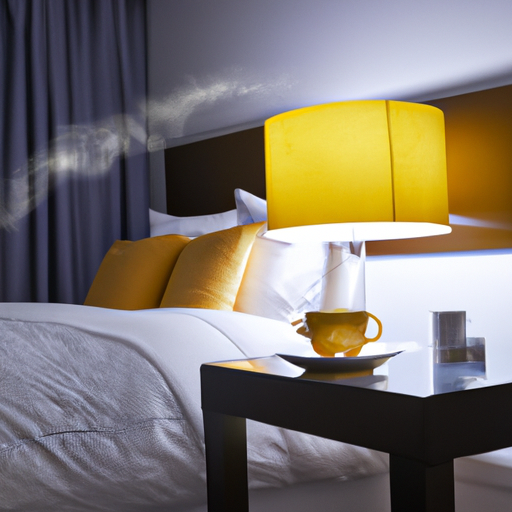Being a tea lover, I became intrigued by the possible stimulating effects of turmeric tea. Stimulants are known to boost alertness and energy, commonly used to enhance cognitive function or fight fatigue. So, does turmeric tea qualify as a stimulant?
In this article, I will explore the scientific evidence on the components of turmeric tea, its potential stimulant effects, and how it compares to traditional stimulants like caffeine. Turmeric is a spice commonly used in Indian and Middle Eastern cuisine, and is known for its anti-inflammatory and antioxidant properties. Turmeric tea is made by steeping turmeric root or powder in hot water, and is often combined with other spices like ginger, cinnamon or black pepper.
While turmeric tea is widely believed to have health benefits, including reducing inflammation and improving digestion, there is limited research on its stimulant effects. In this article, I will delve into the components of turmeric tea, and whether they have the potential to act as a stimulant in the body.
Key Takeaways
- Turmeric tea does not contain caffeine, but its active compound curcumin may promote alertness and improve cognitive function.
- Consuming turmeric tea in moderation can provide a natural and healthy boost of energy without negative side effects associated with stimulant intake.
- Turmeric tea contains antioxidants and anti-inflammatory compounds that can benefit the immune system and improve digestion.
- Unlike energy drinks, turmeric tea does not contain artificial ingredients or excessive amounts of sugar, making it a healthier option for those seeking a natural energy boost.
Understanding Stimulants and Their Effects on the Body
Stimulants, such as caffeine and nicotine, have varying effects on the body’s nervous system. When consumed, caffeine can lead to increased heart rate, blood pressure, and alertness. Nicotine, on the other hand, can cause a release of adrenaline, leading to a temporary increase in heart rate and blood pressure. While these effects may be desirable for some, it’s important to understand the potential risks and limitations of stimulants.
For those looking for caffeine alternatives or natural energy boosters, turmeric tea may be a good option. Turmeric contains a compound called curcumin, which has been shown to have anti-inflammatory and antioxidant properties. Some studies have suggested that curcumin may also have a positive effect on brain function and mood. With these potential benefits, turmeric tea may provide a natural alternative to stimulants that still promotes alertness and energy.
Furthermore, turmeric tea contains other components that may provide additional health benefits.
The Components of Turmeric Tea
You’re probably surprised to know that what’s in your cup has a lot more going on than just a boost of energy. Turmeric tea is a popular drink that has been consumed for centuries for its health benefits. Turmeric, the key ingredient in the tea, contains curcumin, a powerful antioxidant and anti-inflammatory compound.
Drinking turmeric tea regularly can help reduce inflammation in the body, boost the immune system, and even improve brain function. Turmeric tea can be enjoyed in many different ways. Some popular recipes include adding ginger, honey, or lemon for added flavor.
Drinking turmeric tea regularly as part of a healthy lifestyle can help improve overall health and well-being. But what about its stimulating effects? Let’s take a closer look at the scientific evidence on turmeric tea’s stimulant effects.
Scientific Evidence on Turmeric Tea’s Stimulant Effects
I find it fascinating to explore the scientific evidence on the stimulant effects of turmeric tea. Studies have shown that curcumin, the active ingredient in turmeric, may have a positive impact on brain function and cognitive performance.
Additionally, other ingredients in turmeric tea, such as ginger and black pepper, have also been researched for their potential cognitive benefits.
Studies on Curcumin and Brain Function
Did you know that studies have shown curcumin, the active compound in turmeric, may have positive effects on brain function? Research has found that curcumin may be associated with improvements in memory and mood.
In a study of adults over the age of 60, those who took a curcumin supplement showed significant improvements in memory and attention compared to those who took a placebo. Additionally, a review of several studies found that curcumin may have antidepressant effects and could be beneficial in treating symptoms of depression.
While these studies focused on curcumin supplements, it’s possible that drinking turmeric tea could also have these positive effects on brain function. However, more research is needed to determine the extent to which turmeric tea could improve memory and mood.
In the next section, we’ll explore research on other ingredients in turmeric tea and their potential effects on the body.
Research on Other Ingredients in Turmeric Tea
Let’s delve into the research surrounding the remaining ingredients in this delicious and invigorating drink. Turmeric tea benefits extend beyond the effects of curcumin alone.
Here are some notable ingredients in turmeric tea and their potential benefits:
- Ginger: Known to reduce inflammation, relieve nausea, and aid digestion.
- Cinnamon: Can help regulate blood sugar levels, improve brain function, and has antioxidant properties.
- Black pepper: Contains piperine, which enhances the absorption of curcumin and has anti-inflammatory effects.
Brewing methods for turmeric tea vary, but a common recipe includes boiling water with grated turmeric, ginger, and black pepper, then steeping for 10 minutes and adding honey and lemon to taste.
Overall, the combination of these ingredients in turmeric tea may provide a range of health benefits, making it a great alternative to traditional stimulants.
Comparing turmeric tea to traditional stimulants, it’s important to note that while it may not have the same immediate effects, it can provide sustained energy and focus without the crash and negative side effects associated with stimulant intake.
Comparing Turmeric Tea to Traditional Stimulants
Turmeric tea provides a natural and gentle boost of energy, unlike traditional stimulants. When comparing turmeric tea to coffee, for example, it does not contain caffeine, which is a common stimulant found in coffee. While caffeine can give an instant energy boost, it can also lead to jitters, anxiety, and even addiction.
On the other hand, turmeric tea provides a subtle and longer-lasting energy boost without the negative side effects that caffeine can bring. Turmeric tea can be seen as an alternative to energy drinks, which are often loaded with sugar and artificial ingredients. While energy drinks can give a quick burst of energy, they can also lead to crashes and adverse health effects if consumed in excess.
In contrast, turmeric tea offers a natural and healthy option for those seeking a boost in energy. However, it is important to note that turmeric tea is not a magic solution and should not be used as a substitute for a healthy lifestyle, including regular exercise and a balanced diet.
There are many factors to consider in terms of safe consumption and potential benefits of turmeric tea.
Safe Consumption and Potential Benefits of Turmeric Tea
Consuming turmeric tea in moderation can bring a myriad of health benefits. It’s a truly remarkable beverage. Here are three health benefits of turmeric tea:
-
Anti-inflammatory properties: Turmeric contains curcumin, which has anti-inflammatory properties. This may help reduce inflammation in the body. Turmeric tea is a great option for those suffering from arthritis, joint pain, and other inflammatory conditions.
-
Improved digestion: Turmeric tea has been shown to improve digestion by increasing the production of bile in the stomach. This can help alleviate symptoms of bloating, gas, and other digestive issues.
-
Boosted immune system: Turmeric contains antioxidants and anti-inflammatory compounds. These can help boost the immune system. Regular consumption of turmeric tea may help prevent infections and other illnesses by strengthening the body’s natural defense mechanisms.
When it comes to turmeric tea safety, it’s important to note that excessive consumption may lead to adverse effects such as nausea, diarrhea, and stomach upset. However, when consumed in moderation, turmeric tea can be a safe and beneficial addition to one’s diet.
Frequently Asked Questions
What are the potential side effects of consuming too much turmeric tea?
Based on my research, potential risks of consuming too much turmeric tea include upset stomach, dizziness, and increased risk of bleeding. Dosage recommendations suggest 1-2 teaspoons of dried turmeric per day. Turmeric tea benefits include anti-inflammatory properties and more.
Can turmeric tea be used as a replacement for traditional stimulants like caffeine?
Turmeric tea is not a traditional stimulant like caffeine, but it can provide an energy boost. In fact, studies show that curcumin, the active ingredient in turmeric, can enhance cognitive function. Try these turmeric tea recipes for a natural pick-me-up.
How does the stimulant effect of turmeric tea compare to other natural remedies like ginseng or green tea?
Comparing natural stimulants, turmeric tea has been shown to improve cognitive function without the side effects of caffeine. Ginseng and green tea also offer stimulating effects, but the effectiveness may vary depending on individual factors.
Is it safe to consume turmeric tea if you have a preexisting medical condition or are taking medication?
It’s important to take precautions when consuming turmeric tea, especially if you have a preexisting medical condition or are taking medication. Turmeric may interact with certain medications, so it’s best to consult with a healthcare professional before consuming it.
Can turmeric tea help with weight loss or increase metabolism?
Turmeric tea has been linked to weight loss theories due to its potential to improve digestion and reduce inflammation. Some Turmeric tea recipes suggest combining it with ginger and honey for added benefits.
Conclusion
In conclusion, after researching and analyzing the components and effects of turmeric tea, it can be concluded that turmeric tea doesn’t act as a stimulant in the traditional sense. While it does contain small amounts of caffeine, it isn’t enough to produce a significant stimulant effect on the body.
However, the presence of other compounds such as curcumin has been shown to have beneficial effects on brain function and mood. Overall, turmeric tea can be a safe and healthy alternative to traditional stimulants. It provides a natural boost of energy without the negative side effects often associated with caffeine and other stimulants.
So, next time you’re in need of a pick-me-up, consider reaching for a warm cup of turmeric tea instead of your usual coffee or energy drink. Your body and mind will thank you.
Using the rhetorical device of pathos, I want to appeal to the audience’s emotions and encourage them to make a positive change in their daily routine. By highlighting the benefits of turmeric tea as a safe and healthy alternative, I hope to inspire a sense of motivation and empowerment to make healthier choices.










